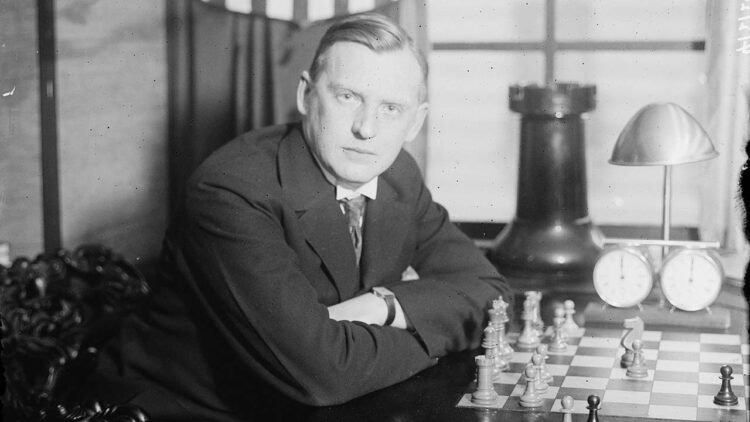Alexander Alexandrovich Alekhine was a world champion chess player from 1927 to 1935, from 1937 until he died.
Full name: Alexander Alexandrovich Alekhine
Born: October 31, 1892
Place of birth: Moscow, Russia
Profiles
Biography
Alexander Alekhine was known for employing a wide range of tactics and was a gifted chess player who achieved mastery at the age of 16 and grandmaster status at the age of 22. During the commencing of the first world war, Alexander was participating in a championship in Mannheim, Germany; after being liberated from detention, he enlisted in the Russian army’s Red Cross division.
Alekhine had become a registered French citizen after the 1917 Russian Revolution and pursued law at one of the universities in Paris. After approximately three matches, he defeated José Ral Capablanca, who came from Cuba, for the international chess title in the year 1927. After eight years, he lost the championship title to Max Euwe from the Netherlands, but he reclaimed it from Euwe in 1937. In 1924, 1925, and 1933, Alekhine surpassed the global blindfold chess record three times.
He also spent a lot of time writing about the game of chess. His game compilations My Best Games of Chess 1908–1923 (1927) and My Best Games of Chess 1924–1937 (1939), both considered masterpieces, are his most well-known works. Alekhine’s innovative play motivated generations of players. His thoroughly developed attacks and extensive annotations considerably influenced chess literature, earning him the appellation Alekhine’s Defense and other opening adaptations.
The Beginning
Alekhine belonged to a prosperous background. Alexander Ivanovich Alekhin’s father was a property holder and a Privy Councilor in the conservative Fourth Duma. Anisya Ivanovna Alekhina is his mother, who has a father of a wealthy man who worked as an industrialist. Alekhine’s mother, brother Alexei, and sister Varvara all taught him how to play chess at the age of seven. His brother closely taught him in the year 1898, and that’s when his journey as a chess master began.
His brother Alexei also played, although they mostly played correspondence chess as they were both too inexperienced to attend a chess club. When he was 12 years old, Alekhine played skillfully while blindfolded. He needed a few years to get his first significant success. Alexander Alekhine assisted his brother with his studies from 1902 to 1904 and then played tournaments by himself from 1905 to 1907. Alekhine was the winner of one of the amateur competitions held in 1909. He displayed hints of being a world-class player as the years flew by. He shared seventh place out of 16 players in the prestigious Hamburg chess tournament in 1910 with 15 wins, one loss, and six draws, following Carl Schlechter, Frank Marshall, and Aaron Nimzowitsch.
Notable Achievements
All Russian Amateur (1909)
Alekhine won the All Russian Amateur Tournament in 1909. It was a warm-up for the worldwide competition and Alexander Alekhine’s breakthrough big victory at sixteen.
Scheveningen (1913)
in 1913, Alekhine dominated the Scheveningen tournament. This competition commemorated the Nederlandschen Schaakbond’s 40th anniversary and was hosted in Scheveningen from July 28 to August 8, 1913. It was an early triumph for Alekhine. He claimed the first spot a round before the conclusion by dominating his first eight matches and accumulating 11 1/2 12, the only imperfection being a draw with Yates.
Notable Games
Capablanca vs Alekhine (1927)
Alekhine faced Capablanca for the World Championship in 1927. The 34th and last match took four days to finish, with continuances, and ended on November 29 when Capablanca failed to appear to restart play. Instead, he wrote a note of congratulations and resignation. Neither did the ex-champion attend the December 8 closing event. Alexander Alekhine did participate, and he went on to become the fourth world chess champion.
One of the notable victories for Alekhine was game #11 where a Queens Gambit Declined was played.
Alekhine vs Bogoljubov (1934)
When reported that Alexander Alekhine’s upcoming championship match would be facing Efim Bogolubov again, the chess community responded with something less than jubilation. The best of 30 games and six victories were the tournament criteria. After 26 rounds, Alekhine was declared the winner.
Euwe vs Alekhine (1937)
Alexander Alekhine invited Max Euwe to a rematch, which Euwe accepted under the game terms. It was Alekhine’s last title defense. Until he died in 1946, he was the World Chess Champion.
Did you enjoy reading about Alexander Alekhine? If you did, you might be interesting in reading other player profiles such as Hikaru Nakamura, Emanuel Lasker, and Paul Morphy.


